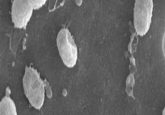Could plant-based foods be a route for antibiotic resistance?

Research examines how plant-based foods can contribute to the spread of antibiotic resistance to the gut microbiome.
In the USA, 20% of the yearly 2 million antibiotic-resistant infections are estimated to result from agriculture. Provided by the US Centers for Disease Control, this estimate is based on patients who eat meat – little research has examined exactly how eating plants contributes to antibiotic-resistant infections.
Now, research presented at ASM Microbe 2019 (CA, USA; 20–24 June) has sought to increase our understanding, elaborating on how plant-foods serve as vehicles for transmitting resistance to the gut microbiome. There, ‘superbugs’ can colonize the intestine for months to years before causing symptomatic infection.
“We found differences in the ability of bacteria to silently colonize the gut after ingestion, depending on a variety of host and bacterial factors.”
To do this the team, from Keck School of Medicine at the University of Southern California (CA, USA), developed a new lettuce–mouse model. The lettuce was exposed to resistant E. coli, fed to the mice, and the mouse fecal samples analyzed.
“We found differences in the ability of bacteria to silently colonize the gut after ingestion, depending on a variety of host and bacterial factors,” commented lead author Marlène Maeusli.
They utilized two different antibiotics, showing that one had no effect on the ability of the bacteria to hide in the intestine, while the other did. “We mimicked antibiotic and antacid treatments, as both could affect the ability of superbugs to survive passage from the stomach to the intestines,” Maeusli continued.
-
Antibiotic resistance in the human gut microbiome
-
Bad prescription: antibiotic misuse in our food
-
A ‘perfect storm’ for antibiotic resistance
The team is now seeking to further understand the plant characteristics and host factors that affect our gut’s community – both those that put us at risk for colonization and those that don’t.
“The environment and human health – in this context via agriculture and microbiomes – are inextricably linked,” concluded Maeusli. “Our findings highlight the importance of tackling foodborne antibiotic-resistance from a complete food chain perspective that includes plant-foods in addition to meat.”
Find out more about the role of the environment and pathogens on human health and medicine at the upcoming, free BioTechniques online event.





